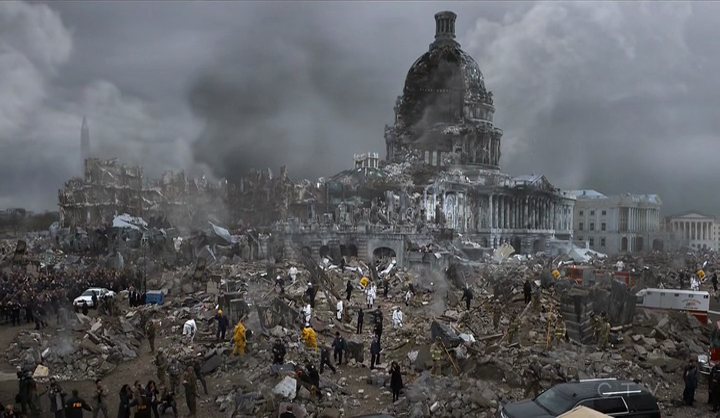JANUARY 24, 2021 – With our month-long house guests’ (son/daughter-in-law) departure Friday, so went nightly card games, lively banter, and scintillating conversation.
“We’ll have to find a show to watch,” I said to my wife.
Yesterday evening we designated . . . Designated Survivor and binge-watched four episodes. For story line(s), writing, acting, directing, casting, editing, we assign five stars.
If you haven’t watched Designated Survivor, it’s about a fired—or about to be fired; the ambiguity is consequential—HUD Secretary, who’s the “designated survivor” for governmental continuity if something untoward occurs while the president, the rest of his cabinet, and vice president are at the Capitol for the state of the union speech.
Something bad does occur: a blast blows the Capitol to kingdom come. So goes government: the entire Supreme Court, Joint Chiefs of Staff, innumerable other high-ranking officials, including . . . all of Congress, except its (non-attending) designated survivor—a power-mongering Congresswoman with no express party designation, though we know full well, which party is implied—and another Congressman who survives “miraculously.” We soon learn (ahead of every character except two FBI players) he’d exited the House Chamber just before the blast and closeted himself in Room 105—where a bomb shelter had been constructed furtively as part of a recent renovation project.
As smoke rises from the Capitol ruins, secret service and a hastily-summoned circuit court judge swing into action—to install Tom Kirkman, alias Kiefer Sutherland, as president. In those furious moments, we find the unassuming new leader clad in jeans and a Cornell sweatshirt. Three years before, he’d been plucked from academia, not the political realm, to effect change in—yawn—affordable housing policy. After three years of loyal service, he’d had a recent falling out with the president.
After an “explosive” start, the show unfolds with a flurry of over-lapping sub-plots expertly woven into a tightly wound story. Immediately, a trigger-happy general, a seditious (Michigan) governor, the not-to-be-trusted Congresswoman, and much of the country blame Muslims. (But see above “miraculous” survival of rising-star-and-decorated-war-hero-Congressman.) Meanwhile, people of power question Kirkman’s legitimacy. His lack of experience—he’s “HUD,” not “State,” “Defense,” or “Homeland Security”—further undermines his authority.
The president is soon surrounded by a herd of sharp-horned dilemmas. As with everything human, “black and white” quickly devolves into “shades of grey.” Yet, for principled characters (and viewers), fundamental distinctions between “right” and “wrong” hold up. In the end, character—in league with intelligence—matters, however otherwise flawed a character might be. That’s the core of this remarkable series—just as with West Wing or other high-end dramatizations of the human condition.
First aired before Trump was elected, Designated Survivor anticipated January 6—and the political turmoil that overwhelmed America for the four preceding years.
(Small details representative of the show’s sophistication: the dead president’s surviving (and estranged) son, we learn, is an alumnus of Williams College, where he’d performed Bartok’s Violin Concerto No. 2 (!) in a recital attended by the dad—unbeknownst to son—incognito.)
If you haven’t, watch this show.
(Remember to subscribe to this blog and receive notifications of new posts by email.)
© 2021 by Eric Nilsson
